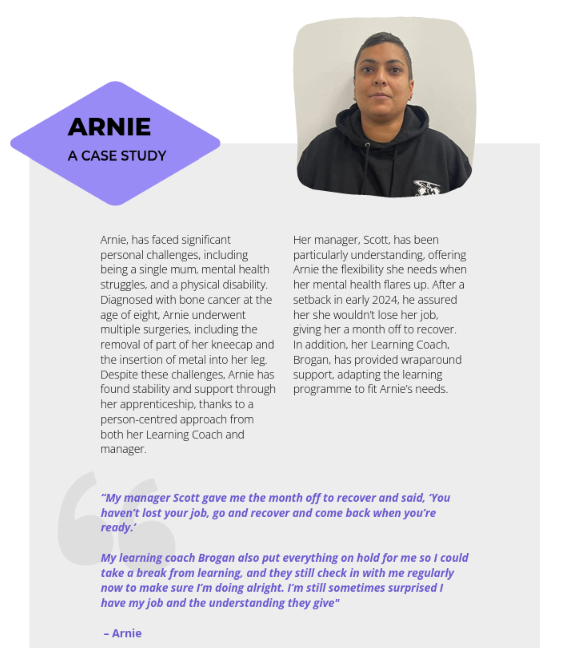Sport has long been linked to better mental health but at Coach Core Foundation it’s much more than that.
Laura Larsson, head of impact and research at our 2025 charity partner Coach Core, explains how the programme supports apprentices not just through training and work experience but with mentoring, wellbeing and inclusion at every stage.
Laura shares how mental health and inclusion go hand in hand across Coach Core’s work, creating confidence, belonging and lasting change for young people.
Read Laura’s full Q&A here:
The positive impact that sports and exercise have on mental health is well documented. What does Coach Core do to help its apprentices maintain and improve their mental health?
Coach Core recognises that wellbeing is fundamental to every apprentice’s success. Beyond providing qualifications and work experience, the programme takes a holistic, person-centred approach that actively supports apprentices’ mental health.
Apprentices receive one-to-one mentoring and pastoral care from learning coaches who help them navigate personal and professional challenges, offering regular check-ins, guidance, and emotional support. Employers are also encouraged to provide well-being initiatives, such as counselling access, gym memberships, and flexible working arrangements.
Coach Core’s apprenticeships do more than build careers – they provide vital support for young people’s mental health and resilience. Many of those we work with face significant barriers, including unemployment, poverty, disability, or past trauma. These challenges often contribute to low self-esteem, anxiety, and poor wellbeing. Through our programmes, we help change that.
- Improved mental wellbeing: Independent wellbeing surveys show that our apprentices report increases in life satisfaction (+0.7), happiness (+0.2), and worthwhileness (+0.4), alongside a reduction in anxiety (-0.15). In 2024 alone, this generated a wellbeing benefit valued at £2.11 million
- Confidence and resilience: 96% of apprentices reported increased confidence, while 92% noted improvements in productivity and resilience thanks to tailored one-to-one coaching support
- Support during mental health struggles: Our approach is person-centred, ensuring apprentices can continue to thrive even during difficult times. For example, Arnie, who faced serious health issues and ongoing mental health challenges, was supported with flexible learning and pastoral care, enabling her to keep her job and rebuild stability
Case studies such as Arnie’s, a single parent managing mental health and disability, show how apprentices are supported with compassion and flexibility, including time off when needed and tailored learning adjustments. Data from Coach Core’s wellbeing surveys show measurable improvements across the programme, with apprentices reporting higher life satisfaction, confidence, and reduced anxiety. By combining sport, mentoring, and inclusion, Coach Core ensures apprentices not only gain skills for work but also build resilience, self-esteem, and positive mental health for life.

You work to support young people who traditionally may experience barriers, discrimination, and lack of opportunities. What is the significance of inclusion to Coach Core?
Inclusion sits at the heart of Coach Core’s mission and values. The charity’s vision is that “every young person can access meaningful education and employment opportunities without barriers and discrimination.”
Coach Core specifically supports under-represented young people, including those from deprived communities, ethnic minority groups, care experience, disabilities and LGBTQ+ backgrounds helping them overcome social and economic barriers through accessible apprenticeships in sport and physical activity. In 2024 alone, 23% of apprentices were from ethnic minority backgrounds, 38% from the most deprived areas, and over half (57%) had additional learning or support needs. Inclusion also extends to employers. Coach Core helps organisations adapt their workplaces, train mentors, and understand the diverse needs of apprentices, creating safe, supportive environments where all young people can thrive. This inclusive culture reflects the communities’ apprentices serve and strengthens both workforce and community cohesion.

World Mental Health and World Inclusion Day coincide on 10 October. How do mental health and inclusion coincide/overlap/interplay across Coach Core’s work?
At Coach Core, mental health and inclusion are inseparable. Many apprentices face multiple barriers such as poverty, discrimination or have additional support needs which can directly affect their mental wellbeing. By creating inclusive pathways into employment, Coach Core helps to break down these barriers and provides the supportive relationships and sense of belonging that are vital for good mental health.
Inclusive practice, such as mentoring, flexible learning, and community engagement, creates environments where apprentices feel valued and understood. In turn, this nurtures self-belief, confidence, and motivation. Apprentices like Jamie, who has Down’s syndrome, demonstrate how inclusive opportunities can transform both wellbeing and social attitudes, showing that when inclusion thrives, mental health follows.
How can sport be used to tackle mental health stigma and build belonging?
Claire, who once struggled with her own mental health, has channelled her lived experience into creating community projects that directly support wellbeing. She now leads initiatives such as women’s support groups and “Active Mums,” empowering others to improve both their mental and physical health. Her journey reflects a wider pattern: many young people who join us believe they will “fail in life,” but through meaningful roles, mentorship, and opportunities to make a community impact, apprenticeships can transform this outlook. As she reflects, “My mental health was really bad, but I thought, alright, I’ll give it a go” – and that chance has given her a renewed sense of purpose and belonging.

If you would like to donate to Coach Core, you can do so here.
See Coach Core’s annual impact report here.